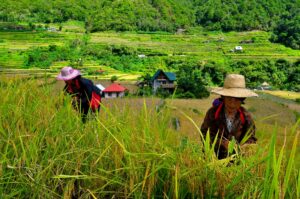by Bushra Humaira Sadaf, Md Abdul Haque, Abu Abdullah Miajy, Sharif Ahmed, Humnath Bhandari
This article highlights how homestead agricultural mechanization empowers women in Bangladesh under the MFS project.
In northern Bangladesh, where agriculture has long been a way of life, women are emerging as entrepreneurs, transforming their livelihoods and the dynamics of their communities. With support from the CGIAR Research Initiative on Mixed Farming Systems, small agricultural machinery, such as fodder choppers, mini rice husking mills, and oil extractors, are changing these women’s lives.
Traditionally, agricultural operations have been labor-intensive and male-dominated. Although women have always contributed to agriculture, their roles have often been limited to household tasks. Introducing small agricultural machinery empowers women to take on more active roles in farming, increasing their involvement in agricultural operations and creating new income-generating opportunities for their families.
This is the story of three women from villages in the Nilphamari District of Bangladesh—Ratna Begum, Aruna Rani Roy, and Layla Begum—whose lives have been transformed by the use of homestead-based small agricultural machinery.

Ratna Begum: A Mini Rice Husking Mill Entrepreneur
Ratna Begum, 27, lived a quiet life in Shahbajpur, Rangpur Sadar, managing her household and caring for her two young children. Her husband, Belal Hossain, worked as a seasonal agricultural laborer and driver during the off-season, earning a modest income of BDT 8,000 per month. Without a steady income of her own, Ratna often struggled to make ends meet.
Everything changed in 2022 when she joined the MFS initiative. Through the program, Ratna received training and was given a mini rice husking mill, which opened a new chapter in her life as a budding entrepreneur.
“I used to rely entirely on my husband’s income,” Ratna explains. “Now, with the husking mill, I can mill paddy and wheat for my neighbors and earn BDT 200-300 daily. I also buy paddy from farmers, mill it, and sell the rice in the village.”
Within just a few months, Ratna’s business started generating an additional income of BDT 6,000 to 7,500 per month, significantly contributing to her family’s income. Her goal is to expand her business beyond her village and sell milled rice in the city center. As her reputation grows, she is attracting more customers, serving at least 8 to 10 customers daily with paddy and wheat milling, with some even coming from nearby villages. The convenience she provides has been a game-changer; villagers no longer have to walk three kilometers to get their rice milled. With her machine, she mills 40 kg of rice in just 20 minutes, allowing women to visit her any time of day.
Ratna dreams of improving the packaging of her milled rice and expanding further with additional support. “I want to receive more training in packaging and marketing my agricultural products,” she says with determination.
The earnings from her rice milling business now significantly contribute to her family’s daily expenses, support her children’s education, and provide her with the independence to plan for future business growth. Ratna Begum’s journey from housewife to entrepreneur powerfully demonstrates how access to the right tools and training can transform lives, proving that women in rural Bangladesh can contribute not only to their household income but also successfully lead businesses in agriculture.

Aruna Rani Roy: An Oil Extractor Machine Entrepreneur
At 35, Aruna Rani Roy from Akaskuri, Nilphamari, always dreamed of doing more for her family. With two sons—one preparing for his board exams and the other working toward his graduation—Aruna felt immense pressure to provide better opportunities for them. Yet, before joining the MFS project, she was confined to the role of a housewife, relying on her family’s monthly income of around BDT 12,500, which barely covered their basic needs.
Everything changed in 2022 when Aruna became a member of the MFS initiative. She received not only training but also a Mustard Oil Extractor machine, marking the beginning of her journey as a small business owner. With the machine, she began milling mustard seeds from local farmers into mustard oil.
The income from her mustard oil business now supports her family’s daily needs, helps her save for her children’s education, and allows her to contribute to their future without relying on loans.
“I never thought I could run a business,” Aruna reflects. “But now I see how much potential there is in mustard oil extraction.”
Every day, Aruna processes 1 kilogram of mustard seeds, extracting and filtering the oil, which she packages and sells in the local market. Her journey showcases how access to resources and training can uplift women, enabling them to contribute meaningfully to their families and communities.
Aruna’s business has not only transformed her financial situation but has also enabled her to think bigger about her family’s future. She no longer relies on microcredits from local NGOs, which she once depended on to support her sons, including funding for her elder son’s computer training. With the income from her mustard oil business, Aruna can now save money and directly invest in her children’s futures.
“I’m saving money for my sons now,” she expresses proudly. “I dream of my eldest joining the army and serving our country. I want to give them a better future.”
The demand for Aruna’s mustard oil has grown alongside an increase in mustard cultivation in her area, as villagers increasingly incorporate mustard oil into their daily cooking. Recognizing the potential for growth, Aruna dreams of expanding her business even further.
For Aruna, the MFS initiative was the key that unlocked her entrepreneurial potential. It provided her with the tools and confidence to transform not only her financial situation but also her family’s future.

Layla Begum: A Chopper Machine Entrepreneur
Layla Begum, 35, lives in Loxmichap, Nilphamari, with her husband, who works at a tea stall, and their two children—a son in class 10 and a daughter in class 3. Like many women in her village, Layla managed her homestead and cared for livestock. However, with limited resources, she struggled to keep her cows healthy and productive. She used to spend around 800 BDT per month on feed and would chop rice straw for her cows herself, dedicating about an hour each day to this task.
Her situation changed dramatically after she joined the MFS initiative. She received training on improved fodder cultivation and was granted a fodder chopper machine. Now, she cultivates improved fodder in her marginal land. The chopper machine allows her to chop fodder and rice straw efficiently, leading to healthier cows, significantly reduced expenses, and more time for other household activities. Layla not only uses the chopper for her own needs but also rents it out to neighbors as an entrepreneur.
“The fodder chopper has made a huge difference for me,” Layla says. “Earlier, I had no income and relied entirely on my husband’s earnings. Now, I earn around BDT 4,000-4,500 per month. With the support of IRRI, fodder cultivation in our village is increasing, and I expect my earnings to grow as more farmers cultivate fodder and familiarize themselves with chopping.”
With her newfound income, Layla no longer worries about small expenses. She spends her money as she sees fit, enjoying a financial independence that once seemed out of reach. Her cows are healthier thanks to a regular supply of fresh, chopped fodder, and she is saving to buy more cows. Layla plans to expand her business by selling fodder to neighboring farmers for 15 BDT per kilogram in jute bags.
“I feel proud that I can now support my family with my own money,” Layla shares. “Even though I have more work now, the extra income makes it all worth it.”
The income from selling fodder has eased her family’s financial pressures, allowing her to reinvest in livestock and improve her household’s quality of life while saving for future needs. Layla’s aspirations extend beyond her current achievements. She plans to acquire additional machines, including a mini rice husking mill, and hopes to receive further training in livestock management to expand her business. Her journey from a homestead caretaker to a confident entrepreneur underscores the transformative impact of mechanization and training in rural Bangladesh.
Mechanization as a Pathway to Empowerment
For Ratna, Aruna, and Layla, homestead agricultural mechanization has not only improved their farming practices; it has opened doors to independence and entrepreneurship. With the support of the MFS initiative, they have broken free from the traditional limitations placed on women in rural Bangladesh. Each of these women is now a business owner, earning her own income and making decisions that shape their families’ futures.
Their stories are a testament to the power of small-scale agricultural mechanization. Beyond the machines, they have gained the confidence to step into leadership roles in their communities, inspiring others to follow in their footsteps.
As more women like Ratna, Aruna, and Layla embrace entrepreneurship, the rural landscape of Bangladesh is gradually transforming. Mechanization has proven to be more than just a tool for farming; it is a catalyst for change, fostering women’s empowerment and financial independence, one machine at a time.
These women’s successes are just the beginning. With continued support from initiatives like MFS, more women can access the tools and training necessary to thrive as entrepreneurs in agriculture. The future holds great promise for women like Ratna, Aruna, and Layla, whose stories demonstrate that with the right resources, women in rural Bangladesh can drive economic and social progress for their families and communities.






